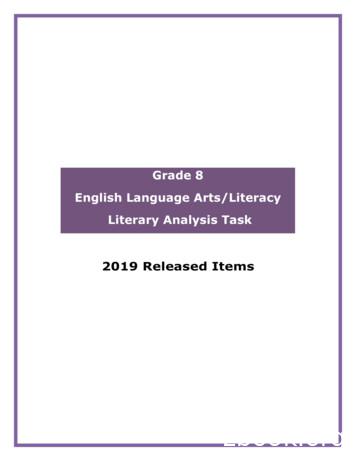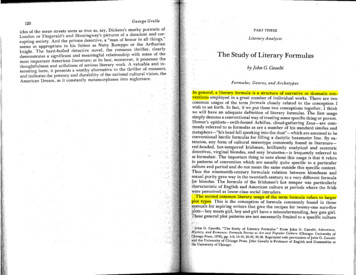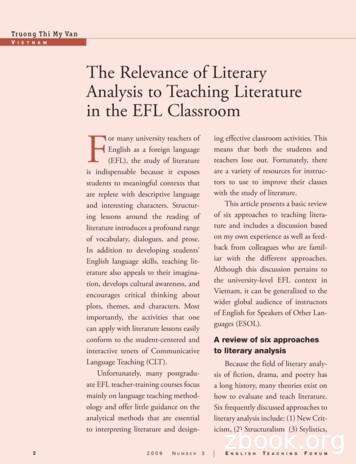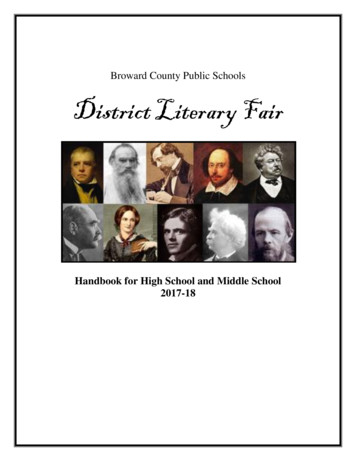Literary Dspace Nplg Gov Ge-PDF Free Download
An Introduction to Literary Criticism and Theory Before we begin our examination and study of literary theory, it is important that we define exactly what literary theory is and is not, identify some of the main characteristics of such, as well as identify some of the key differences between traditional “literary criticism” and “literary theory.” While literary criticism since the late .
Interface in Simulink Azad Ghaffari San Diego State University Department of ECE San Diego CA 92182-1309 12/20/2012 This document provides a tutorial introduction to the dSPACE software (ControlDesk Next Generation version 4.2.1), the dSPACE DS1104 R&D controller board, and their use
Literary Analysis Sample Paper. A literary analysis is an argumentative analysis about a literary work. Although some summary is needed within the argument of a literary analysis, the objective is not to write a report about a book or story. Instead, a literary analysis discusses a writer’s interpretation of a text through
expository guide to literary criticism or literary concepts, nor does it attempt to catalogue the entire body of literary terms in use. It offers instead to clarify those thousand terms that are most likely to cause the student or general reader some doubt or bafflement in the context of literary criticism and other discussion of literary works.
Literary Analysis Sample Paper August 2016 Provided by the Academic Center for Excellence 1. Literary Analysis Sample Paper. A literary analysis is an argumentative analysis about a literary work. Although some summary is needed within the argument of a literary analysis, the objective is not to write a report about a book or story.
Literary Analysis Sample Paper August 2016 Provided by the Academic Center for Excellence 1. Literary Analysis Sample Paper. A literary analysis is an argumentative analysis about a literary work. Although some summary is needed within the argument of a literary analysis, the objective is not to write a report about a book or story.
da zogadi unarebis pasuxebis gas-worebis Semdeg. gasworebis proce-si ki, 15 agvistos dasruldeba. _ erTiani erovnuli gamoc-debi mSvid viTarebaSi mimdina-reobs. situaciis daZabva apel-aciis periodSic ar moxdeba? kaxa lomaia, ganaTlebis min-istri: _ erTiani erovnuli gamocdebi mSvid da saqmian garemoSi mimdinar-eobs. abiturientebi da maTi mSoble-
GE GEL 3.00 "Impartial, Informative, Insightful" BY NATALIA KOCHIASHVILI M ay 9 marks the day when the So-viet Union celebrated victory over fascism. On May 8, 1945, after the decla-ration of capitulation by Germany, World War II ended. May 9 was declared the day of victory over fascism. War veterans traditionally mark the
gan, agreTve qarTuli gvar-saxelebis cnobili mkvlevarisagan, profesor z. WumburiZisgan. yvela im pirs, vinc diakoniZeebis gvaris war-moSobis Sesaxeb mogvawvdis damatebiT cnobebs an gagviwevs oponirebas WeSmaritebis dadgenaSi, wi-naswar movaxsenebT did madlobas.
ba, qarTuli ena _ ai is disciplinebi, romlebic mas mihyavda al. puSkinis saxelobis pedagogiur insti-tutsa Tu Tbilisis saxelmwifo universitetSi, Tbi-lisis aziisa da afrikis intstitutsa Tu universi-tet georgiaSi . qalbatoni meri iyo ramdenime specializebuli sabWos wevri, akad. g wereTlis saxelobis aRmosav-leTmcodneobis institutTan arsebuli .
la qarTuli suliTa, ikiTxeba rogorc qarTuli dramebi, warmogvidgeba qarTul nawarmoebebada, avtorebi rom gadaSaloT, moqmed pirebsac rom SeucvaloT saxelebi; anTu rao, ra Secvla undaT, _ imdeni ucxo saxeli Semosula CvenSi. vaxtang WeliZis Targmanebi gancdilia xelaxlada, xelaxladaa gadatanili procesSi Semoqmedebisa, xelaxladaa gadamuSavebuli Tu Seqm-
Introduction to Literary Criticism. Definition and Use “Literary criticism” is the name given to works written by experts who critique—analyze—an author’s work. It does NOT mean “to criticize” as in complain or disapprove. Literary criticism is often referred to as a “secondary source”. Literary Criticism and Theory Any piece of text can be read with a number of different .
Academic literary criticism prior to the rise of “New Criticism” in the United States tended to practice traditional literary history: tracking influence, establishing the canon of major writers in the literary periods, and clarifying historical context and allusions within the text. Literary biography was and still is an important interpretive method in and out of the academy; versions of .
literature itself. What a Literary Analysis IS A literary analysis is an opinion. You (the writer) are forming an opinion about a literary work, then presenting that opinion (and, more importantly, supporting that opinion) in the form of an essay. Essays about literature should be written in third-person point of view, like any other analytical .
ENG125: Introduction to Literature Critical Literary Theories Purpose: Use this resource to learn about literary criticism. What is literary criticism? Literary Critical Theory is a tool that helps you find meaning in stories, poems
Grade 8 English Language Arts/Literacy . Literary Analysis Task . English LanguageArts/Literacy . 2019 Released Items: Grade 8 Literary Analysis Task The Literary Analysis Task requires students to read two literary texts that are purposely p
The premise of Literary Theory: The Basicsis that literary theory and literary practice - the practice of interpretation - cannot indeed very well be separated, and certainly not at the more advanced level of academic literary studies. One of its aims, then, is to show how theory and practice are inevitably connected and have always been .
Terry Eagleton (T errence Francis Eagleton) is a contemporary literary scholar and a prominent cultural theorist, widely regarded as the one of the foremost Marxist literary critics. With the publication of Marxism and Literary Criticism , and Literary Theory, a popular college text, Eagleton won recognition for producing erudite works of literary
on DSpace software Edited by Dr. A.R.D. Prasad & Dr. Devika P Madalli Faculty Members Documentation Research and Training Centre Indian Statistical Institute, 8th Mile Mysore Road Bangalore 560059, India Organized by National Science Foundation Sri Lanka Sponsored by UNESCO, Bangkok 27 - 30 July 2011 Unite d Nations Educational. Scientific and
An integrated laboratory for real-time signal processing and control has been established at Buck-nell University. The laboratory has ten digital signal processing (DSP) units from dSPACE Corporation [1] and ten Sun workstations. The dSPACE units are controlled and programmed through Simulink [2], which is a graphical interface to Matlab [3].
A Reader’s Guide to Contemporary Literary Theoryis a classic introduction to the ever-evolving field of modern literary theory, now expanded and updated in its fifth edition. This book presents the full range of positions and movements in contemporary literary theory. It organises the theories into clearly defined sections and presents them in an accessible and lucid style. Students are .
MOUNT ASPIRING COLLEGE DEPARTMENT OF ENGLISH - FEMINIST LITERARY CRITICISM - PAGE !3 OF !7. WHAT MARXIST CRITICS DO TAKEN FROM BEGINNING THEORY, BY P. BARRY2: 1. They make a division between the ‘overt’ (manifest or surface) and ‘covert’ (latent or hidden) content of a literary work (much as psychoanalytic critics do) and then relate the covert subject matter of the literary work to .
Literary Analysis The Study of Literary Formulas by fohn G. Cawelti Formulas, Genres, and Archetypes In general, a literary formula is a structure of narrative or dramatic con ventions employed in a great number of individual works. There are two common usages of the term formula closely related to the conception_ I wish to set forth.
to literary analysis. Because the field of literary analy-sis of fiction, drama, and poetry has a long history, many theories exist on how to evaluate and teach literature. Six frequently discussed approaches to literary analysis include: (1) New Crit-icism, (2) Structuralism, (3) Stylistics,
Introduction: What Is Literary Theory and Why Should I Care? LEARNING OBJECTIVES. 1. Examine the kinds of questions that literary theories attempt to answer. 2. Explore the relevance of literary theory to undergraduate studies. 3. Review the steps of the writing process. 4. Develop a plan
“The Tell-Tale Heart” Literary Response English 8 Prompt: Describe in a literary response essay how the author creates suspense throughout the characters, setting, and plot. Assignment: In response to this prompt, you will write a 5-paragraph literary response essay.
Literary Terms Chris Baldick is Professor of English at Goldsmiths' College, University of London. He edited The Oxford Book of Gothic Tales (1992), and is the author of In Frankenstein's Shadow (1987), Criticism and Literary Theory 1890 to the Present (1996), and other works of literary history. He has edited, with Rob Morrison,
cally), Terry Eagleton has defined literary theorists, critics and teachers as "not so much purveyors of doctrine as custodians of a discourse" (201). Literary criticism selects, processes, corrects and rewrites texts in accordance with certain institutional norms of the "literary" - norms which are at any given time arguable, and always histori-
Feminist Theory Introduction Feminist criticism became a dominant force in Western literary studies in the late 1970s, when feminist theory more broadly conceived was applied to linguistic and literary matters. Since the early 1980s, feminist literary criticism has developed and diversified in a number of ways and is
Introduction 11 2. The Literary Canon and New Criticism 21 3. Russian Formalism 31 4. Structuralism 41 5. Marxist Theory 55 6. Psychoanalysis 70 7. Hermeneutics and Reception Theory 81 . sion that literary theory does not really exist as an inde-pendent discipline. There is, many claim, just 'Theory',
the effects of reading literary fiction, we selected literary works of fic-tion by award-winning or canonical writers and compared their effects on ToM with reading nonfiction, popular fiction, or nothing at all. In experiment 1 (22), 86 participants were randomly assigned to read one of six short texts (three literary fiction and three .
(1) learn the major literary movements, writers, trends, and ideas that have shaped Spanish and Latin American peoples; (2) learn modern literary theory and its application in literary analysis; (3) learn the terminology used to engage in discussions about literary criticism; (4) think critically and logically (The course is conducted completely
Literary Theory and Schools of Criticism Introduction A very basic way of thinking about literary theory is that these ideas act as different lenses critics use to view and talk about art, literature, and even culture. These different lenses allow critics to consider works of art based on certain assumptions within that school of theory. The different lenses also allow critics to focus on .
Welcome to ENG 111: Introduction to Literature and Literary Criticism. This three-credit unit course is available for students in the second semester of the first year BA English Language. The course serves as a foundation in the study of literary criticism. It exposes you to forms critical theories and concept in literary criticism. You will also
Journalism 5606W: Literary Aspects of Journalism Nancy Roberts This is a graduate-level course that studies the literary aspects of journalism as exemplified in, and influenced by, works of British and American writers, past and present. These include such writers as: Daniel Defoe, Charles Dickens, William Hazlitt, Samuel Clemens, Stephen Crane,
The Reading Strategies and Literary Elements booklet is composed of reproducible lessons and exercises. The focus lessons provide a focused way of introducing specific literary concepts and reading strategies. The exercises are directly modeled after the End-of-Grade Test. Each exercise contains two or three passages and a
Literary Elements in Fiction The literary elements power standard includes several concepts. First of all, through-out the year, students should be exposed to a variety of genres — fairy tales, folk tales, poetry, fiction and non-fiction. As each is presented to students, discussion about the
Literary Fair in 1998 to provide an opportunity for middle and high schools to recognize their students’ literary accomplishments. The district fair provides a showcase for outstanding student compositions and language arts projects. The categories for writing competition include various
Literary Responses to Mass Violence Literary Responses to Mass Violence Literature served as the program’s academic director; the event bore the special stamp of his vision and ideas. Dan Terris of the International Center for Ethics, Justice and Public Life and Sylvia Fuks Fried of the Tauber Institute provided invaluable institutional
How to Do Literary Theory English 199a Prof. Andrew Warren TF: Alex Creighton CGIS Knafel 050; T, Th - 10-1130 acreighton01@g.harvard.edu Office Hours T 1130-130 (Barker 151) warren@fas.harvard.edu This is a course in the lively history and practice of literary theory. Since literature came into the







































